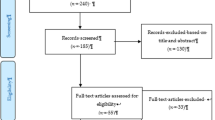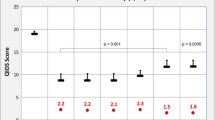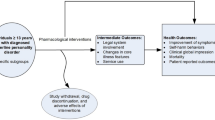Abstract
Over the last 25 years, the appraisal of psychotropic drugs within the scientific community and their representation in the media has changed considerably. The initial optimism in the wake of the introduction of second-generation drugs has increasingly made room for a more critical evaluation of alleged advantages of these drugs. The question arises as to what extent this is reflected in similar changes in the public’s attitudes towards psychiatric medication. Three representative population surveys on attitudes towards psychotropic medication were carried out in Germany in 1990 (N = 3075), 2001 (N = 2610) and 2011 (N = 1223), using the same sampling procedure, interview mode and instrument for assessing attitudes. In order to disentangle time-related effects, an age–period–cohort analysis was performed. Over the time period of 21 years, the German public’s evaluation of psychotropic medication has become markedly more favourable. This change was mostly due to a period effect, i.e. concurrent influences of the social environment people are exposed to. Changes were much more pronounced in the 1990s, while over the following decade only a small, although statistically significant, increase in the favourable appraisal of medication was found. Age and birth cohort had only a minor effect on public attitudes. Our findings suggest that changes in the evaluation of the effects of psychotropic drugs within the psychiatric community and their representation in the media also affect public opinion. Given the ongoing debate about side effects and efficacy of psychiatric medication, future changes of public opinion can be expected.
Similar content being viewed by others
References
Schumer F (1989) Bye–bye blues: a new wonder drug for depression. New Yorker 18(22):46–50
Montagne M (2001) Mass media representations as drug information for patients: the Prozac phenomenon. Subst Use Misuse 36:1261–1274
Toufexis A (1993) Personality pill, Prozac. TIME 11:62–63
Walberg (1990) Promise of Prozac. Newsweek 57:26–38
Kramer PD (1993) Listening to Prozac. Penguin Books, New York
Wurtzel E (1994) Prozac nation. Houghton Mifflin, Boston
Elfenbein D (ed) (1995) Living with Prozac and other selective serotonin-reuptake inhibitors. HarperCollins, New York
Rosenheck R, Perlick D, Bingham S, Liu-Mares W, Collins J, Warren S, Leslie D, Allan E, Cambell EC, Caroff S, Corwin J, Davis L, Douyon R, Dunn L, Evans D, Frecska E, Grabowski J, Graeber D, Herz L, Kwon K, Lawson W, Mena F, Sheikh J, Smelson D, Smith-Gamble V (2003) Effectiveness and cost of olanzapine and haloperidol in the treatment of schizophrenia: a randomized controlled trial. JAMA 290:2693–2702
Lieberman JA, Stroup TS, McEvoy JP, Swartz MS, Rosenheck RA, Perkins DA, Keefe RSE, Davis SM, Davis CE, Lebowitz BD, Severe J, Hsiao JK (2005) Effectiveness of antipsychotic drugs in patients with chronic schizophrenia. N Engl J Med 353:1209–1223
Jones PB, Barnes TRE, Davies L, Dunn G, Lloyd H, Hayhurst KP, Murray RM, Markwick QA, Lewis SW (2006) Randomized controlled trial of the effect on quality of life of second- vs first-generation antipsychotic drugs in schizophrenia: Cost Utility of the Latest Antipsychotic Drugs in Schizophrenia Study (CUtLASS 1). Arch Gen Psychiatry 63:1079–1086
Kahn RS, Fleischhacker WW, Boter H, Davidson M, Vergouwe Y, Keet IPM, Gheorge MD, Rybakowski JK, Galderisi S, Libiger J, Hummer M, Dollfus S, Lopez-Ibor JJ, Hranov LG, Gaebel W, Peuskens J, Lindefons N, Riecher-Rössler A, Grobee DE (2008) Effectiveness of antipsychotic drugs in first-episode schizophrenia and schizophreniform disorder: an open randomized clinical trial. Lancet 371:1085–1097
Lewis S (2009) Second-generation antipsychotics: a therapeutic downturn? Psychol Med 39:1603–1606
Leucht S, Kissling W, Davis JM (2009) Second-generation antipsychotics for schizophrenia: can we resolve the conflict? Psychol Med 39:1591–1602
Kirsch I, Deacon BJ, Huedo-Medina TB, Scoboria A, Moore TJ, Johnson BT (2008) Initial severity and antidepressant benefits: a meta-analysis of data submitted to the Food and Drug Administration. PLoS Med 5:ee45
Horder J, Matthews P, Waldmann R (2011) Placebo, Prozac and PLoS: significant lessons for psychopharmacology. J Psychopharmacol 25:1277–1288
Möller HJ (2008) Isn’t the efficacy of antidepressants clinically relevant? A critical comment on the results of the meta-analysis by Kirsch et al. 2008. Eur Arch Psychiatry Clin Neurosci 258:451–455
Fountoulakis KN, Möller HJ (2011) Efficacy of antidepressants: a re-analysis and re-interpretation of the Kirsch data. Int J Neuropsychopharmacol 14:405–412
Huedo-Medina TB, Johnson BT, Kirsch I (2012) Kirsch et al’.s (2008) calculations are correct: reconsidering Fountoulakis & Möller’s re-analysis of the Kirsch data. Int J Neuropsychopharmacol 15:1193–1198
Shafy S (2008) Entzauberte Glückspillen [Happiness pills deprived of its mystique]. DER SPIEGEL 10:172–174
Bartens W (2008) Gegen Traurigkeit hilft keine Pille. Weitverbreitete Antidepressiva zeigen kaum Wirkung [Pills do not help against sadness—commonly used antidepressants hardly show any effect]. Süddeutsche Zeitung February 02
Schomerus G, Van der Auwera S, Matschinger H, Baumeister SE, Angermeyer MC (2015) Do attitudes towards persons with mental illness worsen during the course of life? An age–period–cohort analysis. Acta Psychiatr Scand. doi:10.1111/acps.12401
Farrer L, Leach L, Griffiths KM, Christensen H, Jorm AF (2008) Age differences in mental health literacy. BMC Publ Health 8:125
Angermeyer MC, Däumer R, Matschinger H (1993) Benefits and risks of psychotropic medication in the eyes of the general public: results of a survey in the Federal Republic of Germany. Pharmacopsychiatry 26:114–120
Angermeyer MC, Matschinger H (2004) Public attitudes towards psychotropic drugs: have there been any changes within recent years? Pharmacopsychiatry 37:152–156
Harrell FE Jr (2001) Regression modeling strategies. With applications to linear models, logistic regression, and survival analysis. Springer, New York
Mirnezami HF, Jacobsson L, Edin-Liljegren A (2015) Changes in attitudes towards mental disorders and psychiatric treatment 1976–2014 in a Swedish population. Nord J Psychiatry. doi:10.3109/08039488.2015.1046916
Reavley NJ, Jorm AF (2012) Belief in the harmfulness of antidepressants: associated factors and change over 16-years. J Affect Disord 138:375–386
Reavley NJ, Cvetkovski S, Jorm AF (2013) The Australian public’s belief about the harmfulness of antipsychotics: associated factors and change over 16-years. Psychiatry Res 206:307–312
Lauber C, Falcato L, Nordt C, Rössler W (2003) Lay beliefs about causes of depression. Acta Psychiatr Scand 108(Suppl. 418):96–99
Riedel-Heller SG, Matschinger H, Angermeyer MC (2005) Mental disorders—who and what might help. Soc Psychiatry Psychiatr Epidemiol 40:167–174
Carta MG, Angermeyer MC, Matschinger H, Holzinger A, Pintus E, Pintus M, Moro MF (2014) Recommendations of the Sardinian public for the treatment of depression. Int J Soc Psychiatry 60:619–626
Partridge B, Lucke J, Hall W (2012) Public attitudes towards the acceptability of using drugs to treat depression and ADHD. Aust N Z J Psychiatry 46:958–965
Goetz J, Fuchs C (2013) Die Pille zum Glück. Wie die Pharmaindustrie trickste, um die Zulassung für gefährliche Antidepressiva zu erhalten [The Happiness Pill. How pharmaceutical companies managed to get approval for dangerous antidepressants]. Süddeutsche Zeitung February 16/17
Le Noury J, Nardo JM, Healey D, Jureidini J, Raven M, Tufanaru C, Abi-Jaoude E (2015) Restoring Study 329: efficacy and harms of paroxetine and imipramine in treatment of major depression in adolescence. BMJ 351:h4320
Harrow M, Jobe TH, Faull RN (2014) Does treatment of schizophrenia with antipsychotic medications eliminate or reduce psychosis? A 20-year multi-follow-up study. Psychol Med 44:3007–3016
Bartens W (2015) Medikamentenstudie vom Ghostwriter [Ghostwriters’ drug study]. Süddeutsche Zeitung 17.09
Lenzen-Schulte M (2015) Wenn Psychopillen das Gehirn schrumpfen lassen [When psycho pills let the brain shrink]. Frankfurter Allgemeine Zeitung 26.01.15
Acknowledgments
The surveys in 1990 were funded by the Federal Ministry of Research and Technology (Az. 0701649) and Tropon Werke GmbH & CoKG, and those in 2001 and 2011 by Deutsche Forschungsgemeinschaft (Az. AN 101/5-1) and Fritz-Thyssen-Stiftung (Az. 10.11.2.175), respectively.
Author information
Authors and Affiliations
Corresponding author
Ethics declarations
Conflict of interest
Matthias C. Angermeyer and Georg Schomerus have received lecturer fees from Lundbeck. All other authors have nothing to declare.
Electronic supplementary material
Below is the link to the electronic supplementary material.
Rights and permissions
About this article
Cite this article
Angermeyer, M.C., Van der Auwera, S., Matschinger, H. et al. The public debate on psychotropic medication and changes in attitudes 1990–2011. Eur Arch Psychiatry Clin Neurosci 266, 165–172 (2016). https://doi.org/10.1007/s00406-015-0660-7
Received:
Accepted:
Published:
Issue Date:
DOI: https://doi.org/10.1007/s00406-015-0660-7




